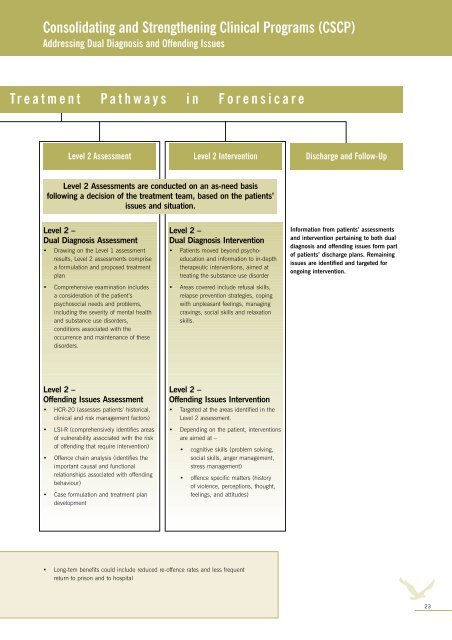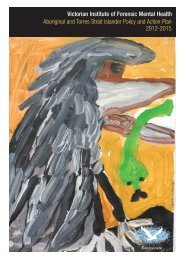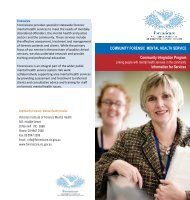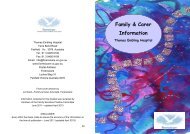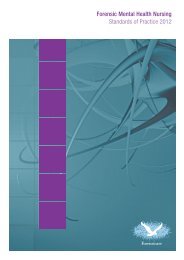Annual Report 2004-2005 - Forensicare
Annual Report 2004-2005 - Forensicare
Annual Report 2004-2005 - Forensicare
Create successful ePaper yourself
Turn your PDF publications into a flip-book with our unique Google optimized e-Paper software.
Consolidating and Strengthening Clinical Programs (CSCP)<br />
Addressing Dual Diagnosis and Offending Issues<br />
Treatment Pathways in <strong>Forensicare</strong><br />
Level 2 Assessment Level 2 Intervention Discharge and Follow-Up<br />
Level 2 Assessments are conducted on an as-need basis<br />
following a decision of the treatment team, based on the patients’<br />
issues and situation.<br />
Level 2 –<br />
Dual Diagnosis Assessment<br />
• Drawing on the Level 1 assessment<br />
results, Level 2 assessments comprise<br />
a formulation and proposed treatment<br />
plan<br />
• Comprehensive examination includes<br />
a consideration of the patient’s<br />
psychosocial needs and problems,<br />
including the severity of mental health<br />
and substance use disorders,<br />
conditions associated with the<br />
occurrence and maintenance of these<br />
disorders.<br />
Level 2 –<br />
Dual Diagnosis Intervention<br />
• Patients moved beyond psychoeducation<br />
and information to in-depth<br />
therapeutic interventions, aimed at<br />
treating the substance use disorder<br />
• Areas covered include refusal skills,<br />
relapse prevention strategies, coping<br />
with unpleasant feelings, managing<br />
cravings, social skills and relaxation<br />
skills.<br />
Information from patients’ assessments<br />
and intervention pertaining to both dual<br />
diagnosis and offending issues form part<br />
of patients’ discharge plans. Remaining<br />
issues are identified and targeted for<br />
ongoing intervention.<br />
Level 2 –<br />
Offending Issues Assessment<br />
• HCR-20 (assesses patients’ historical,<br />
clinical and risk management factors)<br />
• LSI-R (comprehensively identifies areas<br />
of vulnerability associated with the risk<br />
of offending that require intervention)<br />
• Offence chain analysis (identifies the<br />
important causal and functional<br />
relationships associated with offending<br />
behaviour)<br />
• Case formulation and treatment plan<br />
development<br />
Level 2 –<br />
Offending Issues Intervention<br />
• Targeted at the areas identified in the<br />
Level 2 assessment.<br />
• Depending on the patient, interventions<br />
are aimed at –<br />
• cognitive skills (problem solving,<br />
social skills, anger management,<br />
stress management)<br />
• offence specific matters (history<br />
of violence, perceptions, thought,<br />
feelings, and attitudes)<br />
• Long-tem benefits could include reduced re-offence rates and less frequent<br />
return to prison and to hospital<br />
23


